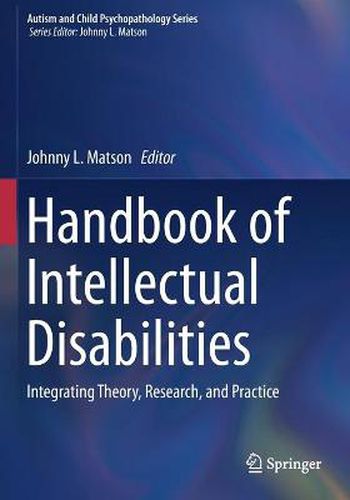Readings Newsletter
Become a Readings Member to make your shopping experience even easier.
Sign in or sign up for free!
You’re not far away from qualifying for FREE standard shipping within Australia
You’ve qualified for FREE standard shipping within Australia
The cart is loading…






This title is printed to order. This book may have been self-published. If so, we cannot guarantee the quality of the content. In the main most books will have gone through the editing process however some may not. We therefore suggest that you be aware of this before ordering this book. If in doubt check either the author or publisher’s details as we are unable to accept any returns unless they are faulty. Please contact us if you have any questions.
This handbook offers a comprehensive review of intellectual disabilities (ID). It examines historical perspectives and foundational principles in the field. The handbook addresses philosophy of care for individuals with ID, as well as parent and professional issues and organizations, staffing, and working on multidisciplinary teams. Chapters explore issues of client protection, risk factors of ID, basic research issues, and legal concerns. In addition, chapters include information on evidence-based assessments and innovative treatments to address a variety of behaviors associated with ID. The handbook provides an in-depth analysis of comorbid physical disorders, such as cerebral palsy, epilepsy and seizures, and developmental coordination disorders (DCD), in relation to ID. Topics featured in this handbook include:
Informed consent and the enablement of persons with ID.
The responsible use of restraint and seclusion as a protective measure.
Vocational training and job preparation programs that assist individuals with ID.
Psychological and educational approaches to the treatment of aggression and tantrums.
Emerging technologies that support learning for students with ID.
Key sexuality and relationship issues that are faced by individuals with ID. Effective approaches to weight management for individuals with intellectual and developmental disabilities.
The Handbook of Intellectual Disabilities is an essential reference for researchers, graduate students, clinicians and related therapists and professionals in clinical child and school psychology, pediatrics, social work, developmental psychology, behavioral therapy/rehabilitation, child and adolescent psychiatry, and special education.
$9.00 standard shipping within Australia
FREE standard shipping within Australia for orders over $100.00
Express & International shipping calculated at checkout
This title is printed to order. This book may have been self-published. If so, we cannot guarantee the quality of the content. In the main most books will have gone through the editing process however some may not. We therefore suggest that you be aware of this before ordering this book. If in doubt check either the author or publisher’s details as we are unable to accept any returns unless they are faulty. Please contact us if you have any questions.
This handbook offers a comprehensive review of intellectual disabilities (ID). It examines historical perspectives and foundational principles in the field. The handbook addresses philosophy of care for individuals with ID, as well as parent and professional issues and organizations, staffing, and working on multidisciplinary teams. Chapters explore issues of client protection, risk factors of ID, basic research issues, and legal concerns. In addition, chapters include information on evidence-based assessments and innovative treatments to address a variety of behaviors associated with ID. The handbook provides an in-depth analysis of comorbid physical disorders, such as cerebral palsy, epilepsy and seizures, and developmental coordination disorders (DCD), in relation to ID. Topics featured in this handbook include:
Informed consent and the enablement of persons with ID.
The responsible use of restraint and seclusion as a protective measure.
Vocational training and job preparation programs that assist individuals with ID.
Psychological and educational approaches to the treatment of aggression and tantrums.
Emerging technologies that support learning for students with ID.
Key sexuality and relationship issues that are faced by individuals with ID. Effective approaches to weight management for individuals with intellectual and developmental disabilities.
The Handbook of Intellectual Disabilities is an essential reference for researchers, graduate students, clinicians and related therapists and professionals in clinical child and school psychology, pediatrics, social work, developmental psychology, behavioral therapy/rehabilitation, child and adolescent psychiatry, and special education.